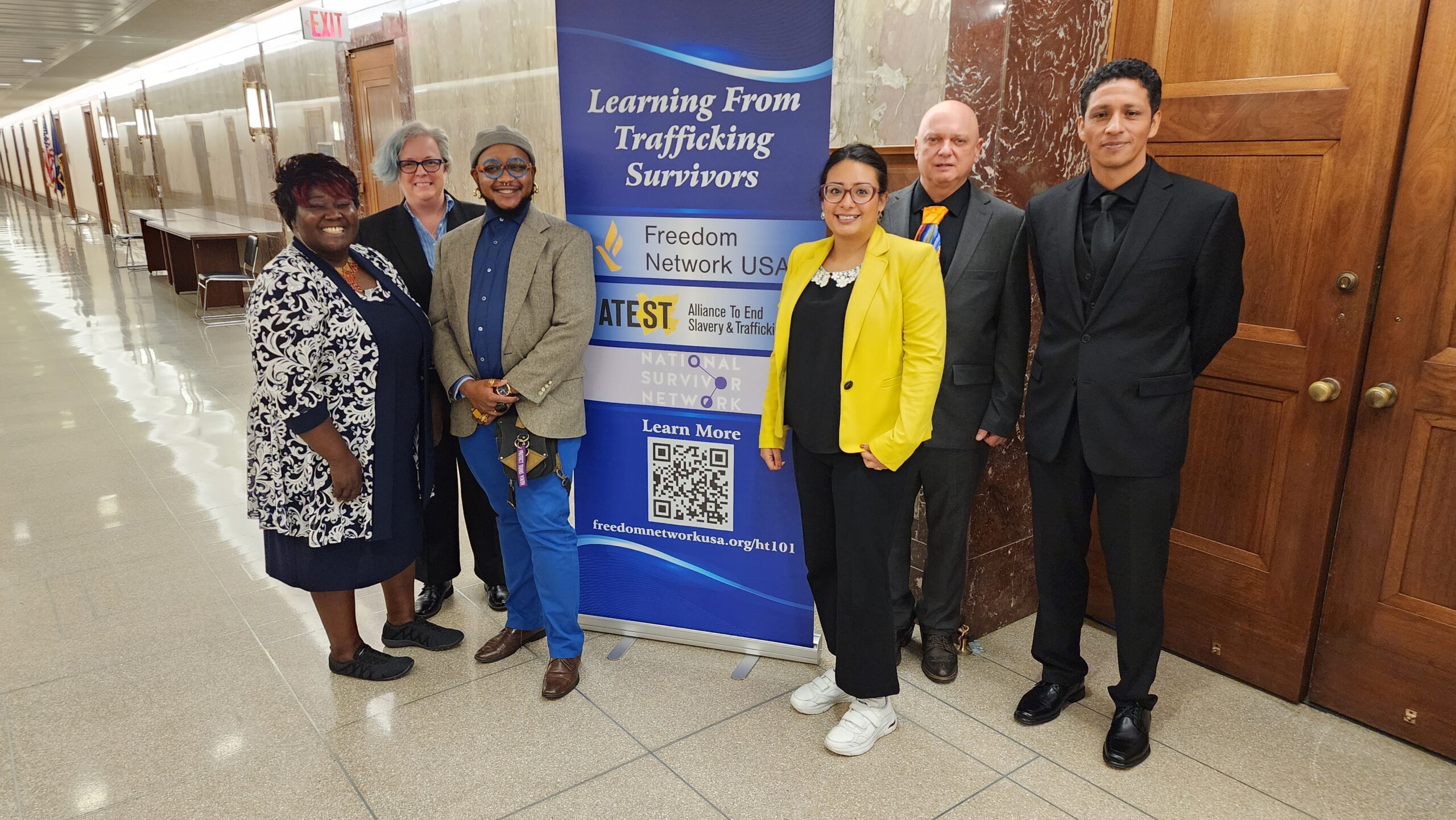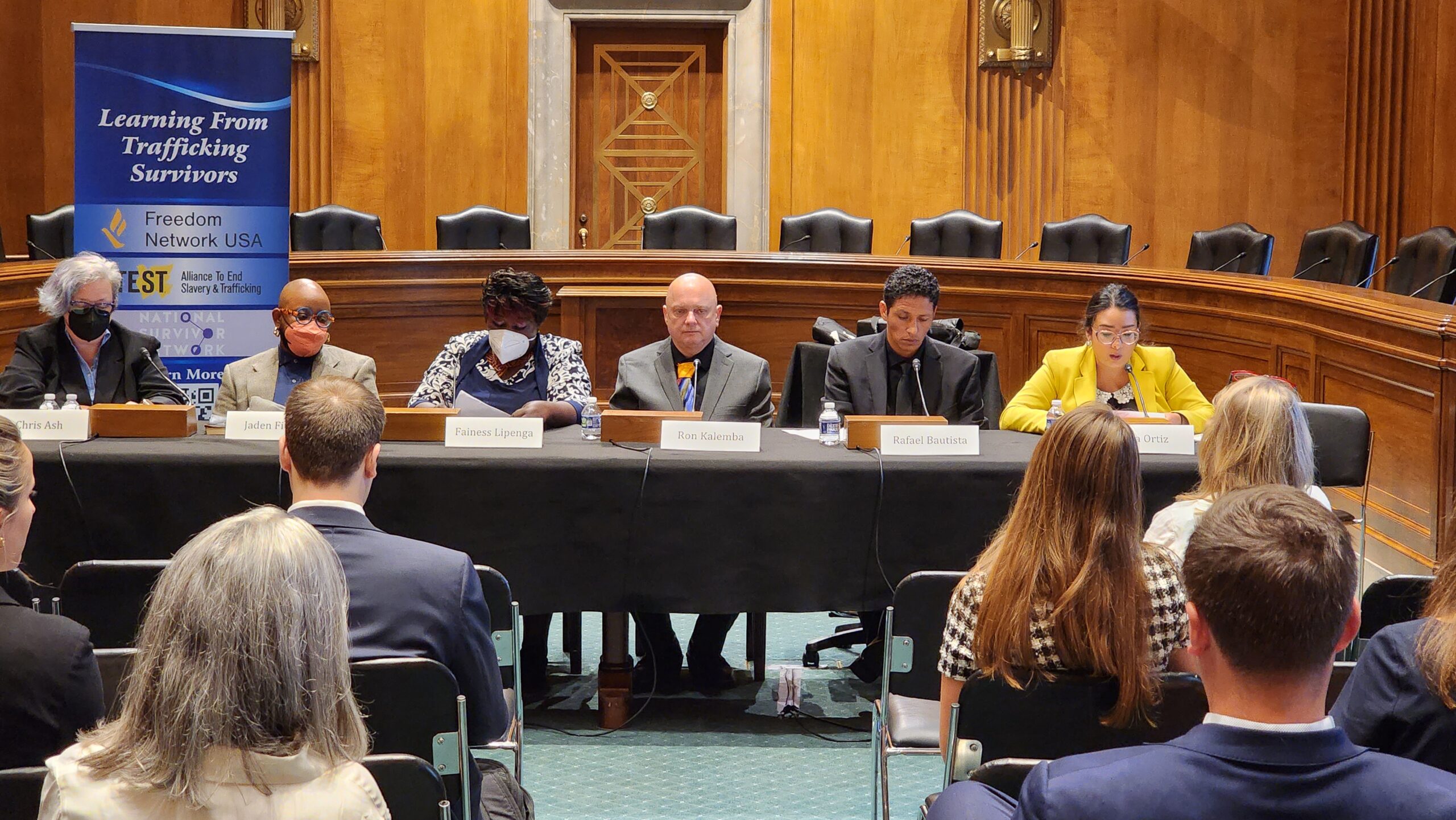Historic Capitol Hill Briefing by Experts with Lived Experience

With a surge in public interest from a summer movie about international child sex trafficking and recent news reports of child labor abuses at workplaces in the United States, Congress is looking to enact new legislation to address human trafficking and forced labor. To encourage Congress to resist rushing new and untested methods into legislation this fall, Freedom Network USA, the National Survivor Network, and the Alliance to End Slavery and Trafficking co-hosted a special congressional briefing on September 14, 2023.
The event was the first of its kind. Instead of Washington-based activists, the event featured people with lived experience of trafficking and exploitation from California, Nebraska, Ohio, North Carolina, and the District of Columbia to highlight solutions that are informed by lived and professional experience.
Since the Trafficking Victims Protection Act created the U.S. government’s legislative framework for addressing human trafficking, survivors’ roles in the decision-making process have been limited, and largely defined externally; they have not been provided enough meaningful opportunities to lead conversations and are often told what to say and how to say it. However, survivors of human trafficking are the people most impacted by anti-trafficking legislation whose collective wisdom should shape the approaches Congress chooses to pursue.
A panel of six experts with lived experience covered a wide range of issues that directly impact survivors every day in the U.S. and abroad. Below is a short summary of each panelist’s remarks.

Chris Ash, Survivor Leadership Program Manager, National Survivor Network – CAST
Chris Ash began by encouraging attendees to rethink how they view survivors. They said, “If you have a distinction in your mind between survivors of trafficking and the professionals who inform your work, I’d like to invite you to wipe it away, because many of us are both, and fully both.” Ash explained how many survivors’ journeys are not defined by a single moment of “escape,” and there is often not necessarily one tidy story of someone’s trafficking experience apart from their other experiences. Many go through a slow, exhausting climb out of the darkness. This means the services survivors need are long-term, individualized, and always voluntary. They also shared that primary prevention, the transformation of the conditions that allow trafficking to happen in the first place, is crucial. For many survivors, these conditions are prior abuse, poverty, inaccessible healthcare, inadequate or unaffordable education, community discrimination, and families crushed under the weight of structural oppression. Ash ended by reminding the attendees that all policy decisions have people they help and people they harm, so we can’t rush to pass surface-level laws that cause harm and instead should dig deeper to look at solutions that help ALL survivors.
Jaden Fields
Jaden Fields started by explaining the importance of avoiding reactive policies that inadvertently harm many survivors, often by increasing the law enforcement response, which fuels the abuse-to-prison-to-more-abuse pipeline. He explained how human trafficking is able to happen because many different systems create vulnerabilities for people to be kidnapped, coerced, and exploited. When we rely only on our legal framework to respond to trafficking, survivors end up criminalized. Many survivors end up with charges for prostitution, trafficking (for being forced to recruit others), drug charges, violent charges for acts of self-defense, gun possession, credit card fraud, theft charges, identity theft charges, kidnapping charges, and immigration status offenses. These are all forms of forced criminality and can result in survivors facing prison labor. Fields encouraged attendees at the briefing to instead be proactive and constructive to move away from rushed, reactive responses. He reminded them to be intentional about listening to survivors about the kind of support they need. He asked them to think about who is missing when they are including people with lived experiences, and to not leave out transgender, gender non-conforming, or intersex people, people of the global majority, labor trafficking survivors, migrants, and survivors of forced child labor. Fields ended by stating, “If survivors aren’t at the center, then we won’t bring an end to this issue.”
Lila Ortiz
Lila Ortiz opened her comments by sharing that the most important thing briefing attendees should understand about the migrant experience is that people come to work in the United States for many reasons: some for economic reasons, others because they want to learn English, broaden their horizons, and explore new opportunities. She added, “But we arrive in a country that we don’t know, without knowing the language, without knowing anyone, without understanding the laws, without knowing what is okay and what is not in the workplace. When faced with a problem, we don’t know where to go or who to turn to.” Ortiz provided five important recommendations for Congress. First, ensure migrant workers receive training on their rights and the agencies and organizations that can help them, including specific information about the state in which they will be working in their own language. Second, require more supervision by the government to see what working conditions are like and provide options to change jobs if there is abuse. Third, improve laws that protect migrant workers and ensure access to justice is real by improving access to representation. Fourth, publish data about immigrant worker visa programs, including locations of employers, the number of workers, and the industries so assistance organizations can find workers who need help. Lastly, punish companies that violate workers’ rights so they do not continue the inhumane treatment of people only looking for a better future.
Fainess Lipenga, Subject Matter Expert, Member of the U.S. Advisory Council on Human Trafficking*, and National Survivor Network Member
Fainess Lipenga began her remarks by reminding attendees we still have work to do to address trafficking in the United States. She said, “As my mother used to say, ‘We can’t go into somebody’s house to fix their mess without fixing our own mess in our own house.’” Lipenga went on to state that in the U.S., we should focus our efforts on creating resources for foreign-born survivors who need more support. She explained that the T-Visa program needs to be expanded to allow survivors to bring additional types of family members into the U.S. Currently, only children, spouses, unmarried children, and parents can join survivors as derivatives. Some survivors’ parents are no longer alive, can’t fly, or they have no children at all. Allowing any family member of their choice to join them in the U.S. would not only give foreign survivors what was taken away from their lives in the first place, but it will help them to heal from trauma. She also noted that some survivors develop long or permanent disabilities because of what they overcome. Lipenga also encouraged attendees to build international anti-trafficking programs that both prevent trafficking and allow survivors to access healing services if they choose to return to their home countries. Lastly, she highlighted the lack of accountability for diplomats who exploit their workers in the U.S. To help workers on diplomatic visas, she recommended all domestic workers traveling with diplomats should receive interviews from the State Department to receive information about their rights and how to report trafficking.
Ron Kalemba, Learning and Training Working Group Co-Facilitator, National Survivor Network
Ron Kalemba started by explaining that many industries have forced labor somewhere in their supply chains. He went on to say that forced labor abroad creates a non-competitive environment for workers in the U.S. because forced labor wages compete with our local economies and that the brunt impact of forced labor falls on people who already live in oppressive poverty. He added, “Many of us in the workforce have had to work in situations where we had to overlook safety concerns and take less pay, or work overtime without overtime pay, because the company we are employed by can’t keep up with the rest of the world, and our options are to tolerate these conditions or be unemployed—which doesn’t feel like much of a choice at all.” He told attendees that having a transparent supply chain is critical to preventing, mitigating, and addressing trafficking and other forms of exploitation, including in the earlier stages of the supply chain, such as the mining of the minerals and assembly of the machines. For goods imported into the U.S., Kalemba noted that the U.S. aims to prevent merchandise produced either partially or entirely using forced labor, but it is difficult to examine a complex supply chain that may have missing information from contractors. He closed by telling congressional staffers at the briefing that their constituents are directly impacted by competition with the prices of products made with forced labor abroad. He recommended awareness, intervention, and preventive action at the federal level.
Rafael Bautista, Member of the U.S. Advisory Council on Human Trafficking*
Rafael Bautista opened his remarks by recognizing that we have made progress in some areas, but we cannot forget the hundreds of people being trafficked every day. He mentioned there is not much that direct service NGOs can do to stop trafficking because they are reactive, and the government must be proactive. He explained that this is a government issue. Government responses are required for the universal implementation of the minimum standards to address trafficking and to address federal laws that increase vulnerability to trafficking. Laws and policies like the Bracero Program [which formalized guest worker systems], harmful child labor laws, the low minimum wage, the exception to labor law that allows 12-year-olds to work in agriculture, anti-union policies, anti-LGBTQ policies, and bills like HR 2601in the current Congress create vulnerabilities to trafficking by excluding vulnerable communities from protections. Even the Trafficking Victims Protection Act makes it difficult to prove child labor trafficking, leaving many kids without access to justice or services. Bautista noted that it is the government that makes these laws, and as a leader in the world, we need to do better. He wrapped up the briefing by explaining, “We need to go to the source, Congress, and you are the source. We need you. Yes, we need you to be inclusive and intentional to protect the most vulnerable communities.”
Congress has a unique opportunity at this moment to show its commitment to addressing human trafficking and should carefully consider approaches that will benefit all victims and survivors and not create unintentional harm. These experts provided a wide range of solutions that put the needs of survivors at the forefront, from prevention to legal support to long-term services. We hope Congress will pursue solutions that do the same.
For more background information on human trafficking from the organizations who sponsored this briefing, visit the event’s special Human Trafficking 101 webpage: www.freedomnetworkusa.org/ht101.
*Members of the U.S. Advisory Council on Human Trafficking appeared as individuals and did not speak on behalf of the council